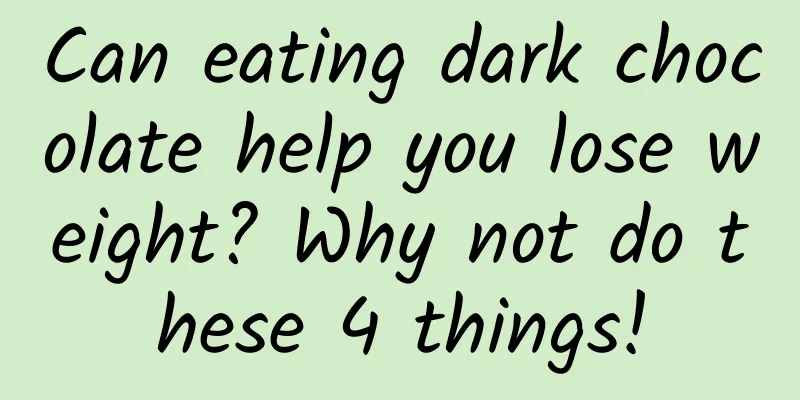Can eating dark chocolate help you lose weight? Why not do these 4 things!

|
Author: Xue Qingxin, registered dietitian Reviewer: Zhong Kai, Director of Kexin Food and Health Information Exchange Center gossip Chocolate has always been a symbol of sweetness, but dark chocolate has been given a buff and a halo of weight loss. This has led many people who are trying to lose weight to turn their attention to dark chocolate, and they endure the bitterness and eat a large piece of it with tears in their eyes every day, fantasizing about becoming thinner and more beautiful by eating dark chocolate. Can eating dark chocolate really help you lose weight? Let's analyze it today. analyze What is dark chocolate Dark chocolate refers to pure chocolate. According to the provisions of "GB/T 19343-2016 Chocolate and Chocolate Products, Cocoa Butter Substitute Chocolate and Cocoa Butter Substitute Chocolate Products", dark chocolate must have a total cocoa solids content of ≥30%, be brown or brown-black in color, and have a bitter cocoa taste. For example, there are common 100% dark chocolate, 85% dark chocolate, 75% dark chocolate... Among them, 100% dark chocolate tastes the most bitter. It's too unpalatable... Image source: e-commerce platform Can eating dark chocolate help you lose weight? Unfortunately, the reality is not as perfect as you imagined. To determine whether a food can help you lose weight, calories are a factor that must be considered. Although 100% dark chocolate tastes bitter and has no sugar in its ingredients, it has a high fat content and is not low in calories at all, and even has higher calories than sugary milk chocolate and white chocolate. For example, the 100% dark chocolate in the picture below has a calorie content of 655 kcal/100 grams. Even if you only eat 20 grams, you will consume 131 kcal, which is equivalent to a small bowl of rice. Image source: e-commerce platform Look at the milk chocolate in the picture below. It has much lower calories than 100% dark chocolate and has a lower fat content. Image source: e-commerce platform So, dark chocolate does have some benefits to health, such as cardiovascular health and anti-inflammation, but you really can't expect to lose weight by eating it. Eating too much will still make you fat! However, if you can control your total calorie intake throughout the day, eating a little dark chocolate every day may help you lose weight. Because a small-scale study showed that eating 2 grams of 70% cocoa dark chocolate every day for 6 months reduced the waist circumference of participants, which may be related to the flavonoids in dark chocolate. [1] Imagine eating only 2 grams of chocolate a day, can you control it? What is the scientific principle of weight loss? To lose weight effectively, two conditions must be met: ▶ Create a calorie gap: To lose weight, you need a calorie gap, which means that the calories you take in are less than the calories you burn. If you eat more calories than you burn every day, you will inevitably gain weight day after day. ▶ Control blood sugar: Controlling blood sugar is not only to prevent diabetes, but also to prevent obesity. Rapid rise in blood sugar after a meal will make people gain weight more easily, especially visceral fat. This is because high blood sugar will stimulate the pancreas to secrete insulin. Under the action of insulin, blood sugar is used to synthesize glycogen (liver glycogen, muscle glycogen) and fat, thereby lowering blood sugar levels. This process will block the decomposition of body fat, stop fat burning in a short period of time, promote fat accumulation, and lead to obesity. Studies have shown that elevated blood sugar levels are particularly likely to increase subcutaneous fat and visceral fat. [2] What should I do to lose weight? If you want to lose weight healthily and effectively, you have to start from 4 aspects. ▶ Diet: Losing weight does not mean dieting. If the energy intake is lower than the basal metabolism in order to lose weight, it will affect the weight loss effect. A balanced diet is more helpful for weight loss. Even during the weight loss period, the three meals should be properly matched, including staple food, vegetables and protein. It is recommended to choose whole grains and potatoes as staple foods, such as oatmeal, black rice, brown rice, steamed sweet potatoes, steamed corn, steamed potatoes, etc., and eat at least one fist of food per meal; Eat 300-500 grams of vegetables every day, of which more than half should be dark vegetables, such as Chinese cabbage, broccoli, purple cabbage, sweet pepper, colored pepper, leek, water spinach, spinach, etc. You should eat protein foods such as meat, eggs, milk and beans. Make sure to eat 1 egg, 300-500 ml of milk, 1 fist of northern tofu/tofu shreds every day. Recommended meats include lean pork, beef, mutton, chicken breast, as well as fish, shrimp and shellfish. Copyrighted stock images, no reproduction is authorized In addition, you should eat 200 to 350 grams of fruit every day, such as 2 kiwis, 1 large apple, 2 oranges, and seven or eight large strawberries. ▶ Control blood sugar: Poor blood sugar control will affect the effect of weight loss, so even if you do not have high blood sugar problems, try not to choose high GI and high GL foods during weight loss. Recommended staple foods include oats, highland barley, black rice, corn, buckwheat, barley, pasta, and udon noodles; optional fruits include apples, pears, peaches, plums, cherries, kiwis, grapefruits, tangerines, oranges, and mangoes. Pay attention to the order of eating for the main meal. You can eat vegetables and protein foods first, then eat the staple food, and finally drink soup; or drink soup first, then eat vegetables and protein foods, and finally eat the staple food. ▶ Exercise: According to the recommendations in the "China Obesity Prevention and Control Blue Book", obese adults should focus on aerobic exercise, which can effectively reduce abdominal fat, reduce weight and improve blood lipids. A total of 150 minutes of moderate-intensity aerobic exercise should be performed each week, and there should be no less than 2 resistance exercises. Do not exercise for a long time at one time. It is best to do it in sessions, each session for no less than 6 minutes. For children and adolescents who need to lose weight, it is recommended to do moderate-intensity aerobic exercise at least 3 to 4 times a week, 25 to 50 minutes each time, and resistance exercise 3 to 4 times a week. ▶ Sleep: Maintaining good sleep quality is also a key factor in healthy weight loss. Staying up late and lack of sleep will not only make people listless, but also affect the secretion of hormones. The secretion of ghrelin will increase and the secretion of leptin will decrease, which will in turn affect people's ability to control appetite, weaken the sense of fullness, and make it easier to eat more food, increasing the risk of obesity. Many studies have shown that sleep duration is correlated with obesity, and that too little sleep increases the risk of obesity. A study of 17,789 people showed that adults who sleep less than 7 hours a day have a higher risk of overweight and obesity, while adults who sleep more than 8 hours a day have a lower risk of central obesity. In addition, sleep quality is also associated with obesity. Snoring/choking/holding breath and awakening ≥ 2 times at night are positively correlated with overweight and central obesity. [3] Therefore, don’t ignore sleep if you want to lose weight! It is recommended to sleep 7-8 hours a day, for example, go to bed at 11pm and get up at 7am. in conclusion Eating dark chocolate to lose weight is not very effective. If you can't control yourself and eat too much at one time, it will increase your risk of gaining weight. Don't rely on a single food to lose weight. You need to pay more attention to balanced nutrition, proper exercise, and adequate sleep. References: [1]Leyva-Soto, Aldo et al. "Daily Consumption of Chocolate Rich in Flavonoids Decreases Cellular Genotoxicity and Improves Biochemical Parameters of Lipid and Glucose Metabolism." Molecules (Basel, Switzerland) vol. 23,9 2220. 1 Sep. 2018, doi:10.3390/molecules23092220 [2]Yuzbashian, Emad et al. "Dietary glycemic index and dietary glycemic load is associated with apelin gene expression in visceral and subcutaneous adipose tissues of adults." Nutrition & metabolism vol. 16 68. 18 Sep. 2019, doi:10.1186/s12986-019-0389-9 [3] Yang Yang, He Tianjing, Zhu Shuzhen, et al. Study on the association between sleep and obesity in adults[J]. Preventive Medicine, 2023, 35(02): 116-120. DOI: 10.19485/j.cnki.issn2096-5087.2023.02.006. The article is produced by "Science Refutes Facts" (ID: Science_Facts). Please indicate the source when reprinting. The cover image and images within this article are from the copyright gallery. Reprinting and quoting them may lead to copyright disputes. |
Recommend
Looking back again, the two years stolen by the epidemic
One minute with the doctor, the postures are cons...
The smart hardware market for the elderly needs to be driven by innovative manufacturers
The smart hardware industry is flourishing with a...
The road to Shu is difficult? The road to Fujian is even more difficult!
Mountains cannot stop you; the sea can also be cr...
China Merchants New Intelligence and Juefei Technology reached a strategic cooperation to develop the digital economy and empower the construction of smart highways
With the release of the 14th Five-Year Plan and t...
Is it good or bad for programmers to encounter such a leader during code review?
Today, when I was browsing the website, I saw a p...
33 data points on Apple in 2014
[[125219]] The technology industry continued to c...
"Thai fragrant rice" is actually mixed with essence! What's going on? 4 tips to help you choose the right rice!
Every year’s 315 Gala is always “shocking”, with ...
In order to cure this disease, he did not hesitate to go to court!
Author's note: In the elementary school Chine...
How is the "big belly" of Tianzhou-6 different from the previous ones?
At 9:00 a.m. on May 30, the Shenzhou 16 manned sp...
"7 tricks + 5 cases" teach you how to make H5 popular in your circle of friends!
People often ask: "What good marketing metho...
Sitting for a long time and having back pain? One move can help you!
As an adult, who hasn’t experienced lower back pa...
APP infringement continues despite repeated bans? The Ministry of Industry and Information Technology strikes hard again
In this era of advanced Internet, there are endle...
Is the agency fee for Liaoyang Bargaining Mini Program high? Liaoyang Bargaining Mini Program Agency Fees and Process
Liaoyang bargaining applet agent is generally div...
9 steps to write a good title quickly!
Anyone who is engaged in operations knows the imp...
Liu Zhihui, Quantitative Learning Cloud Lecture Hall, "Quantitative Learning to Understand the Market and Ambush the Daily Limit" 34th issue
Liu Zhihui's Quantitative Learning Cloud Lect...









